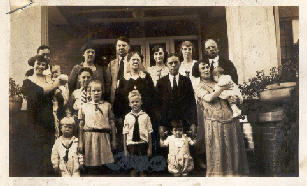
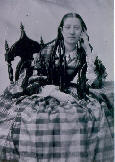
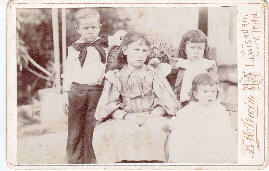
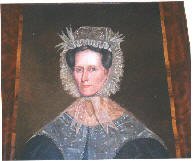
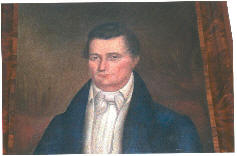



Manoah Bostick Hampton and Cynthia Mitchell Hampton
“Lilie” Hampton 4 oldest children of Lilie Hampton & Walter McClure Lilie Hampton McClure and her family, 1923
BRONAUGH FAMILY
The earliest of this family I can find was Jean Bruneau, relative of the Jean Bruneau -
JOHN BRUNEAU (Jean), lawyer to the bailiwick of Gien. Oruneau returned in the lap of the Roman Church in 1578, with Pierre Fortet, general lieutenant of this city [Haag, III 47]. According to Lebeuf, it had composed a History of the arrived things to Gien, work tooth no not done catalog mention. The two alone written ones of Bruneau that are quoted by the bibliographers are a Speech chres-
JOHN BRUNEAU (Jean) counsel to the présidial of la Rochelle in 1612 and lord of Gravai, left in manuscript an interesting history of the Corps et collège de La Rochelle (unfortunately mutilated manuscript, that exists to the biblioth. of this city). serious conflict having erupted in 1613 between the city of The Rochelle and the bourgeois, Bruneau was chosen of a common agreement by the two parties to examine their titles. The fight finished at the advantage of the bourgeois; his narrative forms the history of college of the Rochelle. — This is probably it same John that one finds registersed, 2 January 1567, on the register of the baptisms of the reformed church of the city as son of Bert man Bruneau and of Mary de Bon ou de Bien; he then would have been 35 years old when he married, 5 Oct. 1602, Jeanne, daughter of John Bourdigalle sieur of the Chabois-
His son JOHN B RUNEAU, born 23 Nov. 1609, acquit in 1637 the important seigneurie of Hure near The Rochelle. He went to sea in 1641 on a ship ordered by the M. of Brézé and was captain of this vessel when it was ennobled by letters in 1667. He married Mary Lecerclère, daughter or niece of the minister Louis Lecerclère sieur of the Chapellière; to the Revocation, he left France with his wife after they had done, 1681, the division of their goods between the three children that remained for them: Paul, Anne, Mary. A son named ARNAUD Bruneau, carried the titles of lord of Hure, The Chaboissière and Rivedoux and married Hélène Guibert, was alive in 1646 and dead in 1681, leaving a son, Henri.
ARNAUD BRUNEAU -
PAUL BRUNEAU was born about 1624 in LaRochelle, France. In History of the Huguenot Emigration to America, it states that "Among the members of the "noblesse" of Aunis that continued faithful to the Huguenot cause, in these days of augmenting persecution, were several who afterwards formed part of the emigration to South Carolina. Paul Bruneau de Rivedoux, Écuyer, son of Arnaud Bruneau, sieur de la Chabossier, Henri Bruneau, écuyer, son of Henri Bruneau de la Chabossier; Henri Auguste Chastaignier, écuyer, seigneur de Cramahe, and Alexandre Thésée Châtaignier, écuyer, seigneur de l'Isle, were all born in La Rochelle.” Paul and Henry Bruneau, and Henry Augustus Chastaigner de Cramahe, had already, while in England, obtained letters of naturalization, March 20, 1686, and April 15, 1687. Traditionally the Bronaughs of Virginia are descendants of "Paul Bruneau, Sieur de la Chabrosier," who was born in la Rochelle and was a grandson of Jean Brunseau, counselor, and eminent citizen whose family obtained patents of nobility in the middle of the 17th century. Paul Bruneau was accompanied in his flight to America by his nephew Henri Bruneau. While in England they obtained letters of Naturalization on March 20, 1636, and changed the spelling of the name to Bronaugh. Paul and Henry Bronaugh were instrumental in building the first Presbyterian Church in South Carolina. The family settled in the Rappahannock country in the last years of the seventeenth century, where the first known ancestor of the family of interest here was born. In January 1707 Paul Bruneau sold sixty acres to Andre Rambert. The memorandum officializing this sale was drafted in French and signed by Rene Ravenel. Will of Paul Bruneau was dated November 14, 1708, but I have not seen a transcript of it.
DAVID BRONAUGH is named in A History of the Bronaugh Family in America. I have little information about David; further research is needed. Two sons: Jeremiah and William, are mentioned most frequently. The original name was French -
JEREMIAH BRONAUGH was born about 1673. A History of the Bronaugh Family states that Jeremiah lived in Stafford Co. had 3 sons: Jeremiah, David and Samuel. Samuel's Will -
From King George Co., Virginia Will Book 1749/50 Pg. 228-
WILL OF JEREMIAH BRONAUGH
In the Name of God Amen. I Jeremiah Bronough of the County of King George in the Parish of Brunswick being in perfect healt and memory, thanks be to God, therefore but calling to mind the shortness of life and certainty of death, do make this my last Will and Testament in manner and form following.
Impris: First, I bequeath my soul to God who gave it and my body to Christian burial at the discretion of my Executor hereafter mentioned.
Item: To my daughter Elizabeth Wright I give four ewes and no more because she has had her full share of my estate already.
Item: To my daughter Ann Chadwell I give the feather bed and furniture that stands in the room where I lodge myself and eight hundred pounds of Tobacco to be paid by my Unknown David Bronaugh the first year after my death.
Item: To my daughter Rosamond Steward I give the feather bed and bolster which was last fild (sic) with a rugg and blankets.
Item: To my daughter Margaret Grant I give two thousand pounds of Tobacco to be paid to my (son) David Bronaugh the second year after my death.
Item: To my son Samuel Bronaugh I give my Negro woman named Cate and all her increase to him and his heirs of assigns forever.
Item: To my son Jere: Bronaugh I give my Negro woman named Jude and all her increase to him and his heirs or assigns forever.
Item: To my son David Bronaugh I give my Negro woman named Jean and all her increase to him and his heirs or assigns forever. I also give and devise unto my son David Bronaugh my land and plantation whereon I now live being by estimation one hundred and fifty one acres to him his heirs or assigns forever. I also give my Negro Caffe and all my other estate not before given to my son David Bronaugh, he to pay of (f) the legacies before mentioned and my debts.
And my Will and Desire is that my Estate shall not be appraised nor inventoried because my debts are few and of small value. I do ordain constitute and appoint my loving Unknown David Bronaugh Executor of this my last Will and Testament. In Witness whereof I have hereunto set my hand and seale this 14th day of April in the year of our Lord 1836.
Jeremiah Bronaugh (seal)
Signed Sealed and Published
to be his Last Will & Testament in Presence of us...
John Coburn
William Stringfellow
John Glendining
CODICIL:
Know all men that these presents that I Jeremiah Bronaugh of the Parish of Brunswick in the County of King George having formerly given to my son Jeremiah Bronaugh my Negro woman named Judee and her increase as in my will above and he being dead without making any will, I do now by this present writing revoke that clause of my will and I do now give and demise the said Negro woman named Judee and all her increase to his two children Kathren Bronaugh and Benjamin Bronaugh and their heirs forever, to be equally divided
between them when the said Kathren Bronaugh shall be married or come to the age of twenty one years and I do order and appoint my Executor, David Bronaugh above mentioned, to see this clause &c: schedule to my will duly executed.
In Witness whereof I have hereunto set my hand and seal this 29th day of February in the year of our Lord 1747/8.
Jeremiah Bronaugh (seal)
Signed Sealed & Published
to be his act and deed in Presence of
us ......
John Champe
Wm. Rowley
Anderson Doniphan
A court held for King George County on Friday, Jan. 5, 1749, the Last Will and Testament of Jeremiah Bronaugh, deceaded, has presented into Court by David Bronaugh his Executor who mad ______thereto and the same was proved by the oaths of John Champs, Gent., and Anderson Doniphan and admitted to record.
-
WILLIAM BRONAUGH, son of David, was born in 1671. He married Anne E. He died in 1718 at Richmond Co., VA. Will on 3 Sep 1717. I have little other information about William, and would appreciate hearing from others about him.
Children of William Bronaugh and Anne E. were as follows:
i. Agnes Bronaugh died in 1747 at Fairfax Co.
ii. William Bronaugh died in 1751 at Fairfax Co.
iii. John Bronaugh died in 1745 at Fairfax Co.
iv. Col. Jeremiah Bronaugh was born on 25 Feb 1701/2. He married Simpha Rosa Ann Field Mason, daughter of Col. George Mason II and Mary Fowke.
-
The Children of JEREMIAH BRONAUGH (son of David) - Wife’s Name Unknown:
1. JEREMIAH BRONAUGH (b.1673 d.Bef 5 Jan 1748/1749-Brunswick Parish,King George Co.,Virginia)
sp: UNKNOWN
|-2. Margaret BRONAUGH (b.Abt 1691)
| sp: (Mr.) GRANT
|-2. Ann BRONAUGH
| sp: (Mr.) CHAPWELL
|-2. David BRONAUGH (b.Abt 1695)
|-2. Rosamond BRONAUGH
| sp: (Mr.) STEWARD
|-2. Col. Jeremiah (Jr.) BRONAUGH (b.25 Feb 1702 d.11 Nov 1749-Brunswich Parish,King George County,VA)
| sp: Simpha Rosa Enfield MASON ( widow of John Dinwiddie)
| |-3. William BRONAUGH
| | sp: UNKNOWN
| |-3. John BRONAUGH (d.1777/1778-Fauquier Co.,VA)
| | sp: Mary Anne CARTER
| |-3. Mary BRONAUGH
| |-3. Ann BRONAUGH
| +-3. Elizabeth BRONAUGH
|-2. Samuel BRONAUGH (b.1705 d.Abt May 1741-Prince William Co.,VA)
| sp: Catherine TALIAFERRO
| |-3. Francis BRONAUGH
| +-3. Thomas BRONAUGH
+-2. ELIZABETH BRONAUGH * (b.1710/1713-Prince William Co.,VA d.Abt 1789-Prince William Co.,VA)
sp: Capt./ Judge JOHN (II) * WRIGHT (b.1706/1707-Copel Parrish,Lower Machodoc,Westmoreland Co.,VA m.1728 d.27 Feb 1792-Fauquier County,VA)
|-3. JOHN (III) WRIGHT * Capt. of Militia (b.30 Oct 1728-Prince William Co.,VA d.30 Oct 1789-Deep Creek,Surry Co.,VA)
| sp: ANN WILLIAMS * (b.15 Oct 1738-Fauquier Co.,VA m.1753 d.Oct 1825-Surry County,NC)
|-3. William WRIGHT (died 1809) ( see article about William Wright)
|-3. Elizabeth WRIGHT (b.1741 d.Abt 1822-Fauquier Co.,VA)
| sp: Shadrack PARLOW
|-3. Rosamond WRIGHT (b.1746 d.1804-Fauquier Co.,VA)
|-3. Mary WRIGHT (b.Abt 1745)
|-3. Maj./Rev. James WRIGHT
|-3. Francis WRIGHT
+-3. Richard WRIGHT
----------------------------------------------------------------------------------------------------------------------
sp: UNKNOWN
|-
| sp: (Mr.) GRANT
|-
| sp: (Mr.) CHAPWELL
|-
|-
| sp: (Mr.) STEWARD
|-
| sp: Simpha Rosa Enfield MASON ( widow of John Dinwiddie)
| |-
| | sp: UNKNOWN
| |-
| | sp: Mary Anne CARTER
| |-
| |-
| +-
|-
| sp: Catherine TALIAFERRO
| |-
| +-
+-
sp: Capt./ Judge JOHN (II) * WRIGHT (b.1706/1707-
|-
| sp: ANN WILLIAMS * (b.15 Oct 1738-
|-
|-
| sp: Shadrack PARLOW
|-
|-
|-
|-
+-
-
I would love to hear from other descendants of Jeremiah Bronaugh. I have made no concerted effort to research the other children of Jeremiah. Our descent is through his daughter Elizabeth.
ELIZABETH BRONAUGH, daughter of Jeremiah Bronaugh, was born about 1710 in Prince William County, VA. My notes about Elizabeth state: “The second great figure in the study of this Wright family is Anne Reed Ritchie, whose three publications (1973, 1979, and 1982) greatly amplified our knowledge of the Wright descendants. One of Mrs. Ritchie’s greatest contributions, however, was to identify the wife of John Wright (ca 1705-
Elizabeth married JOHN WRIGHT (II) -
Always interested in hearing from others who are researching the Bronaugh family!